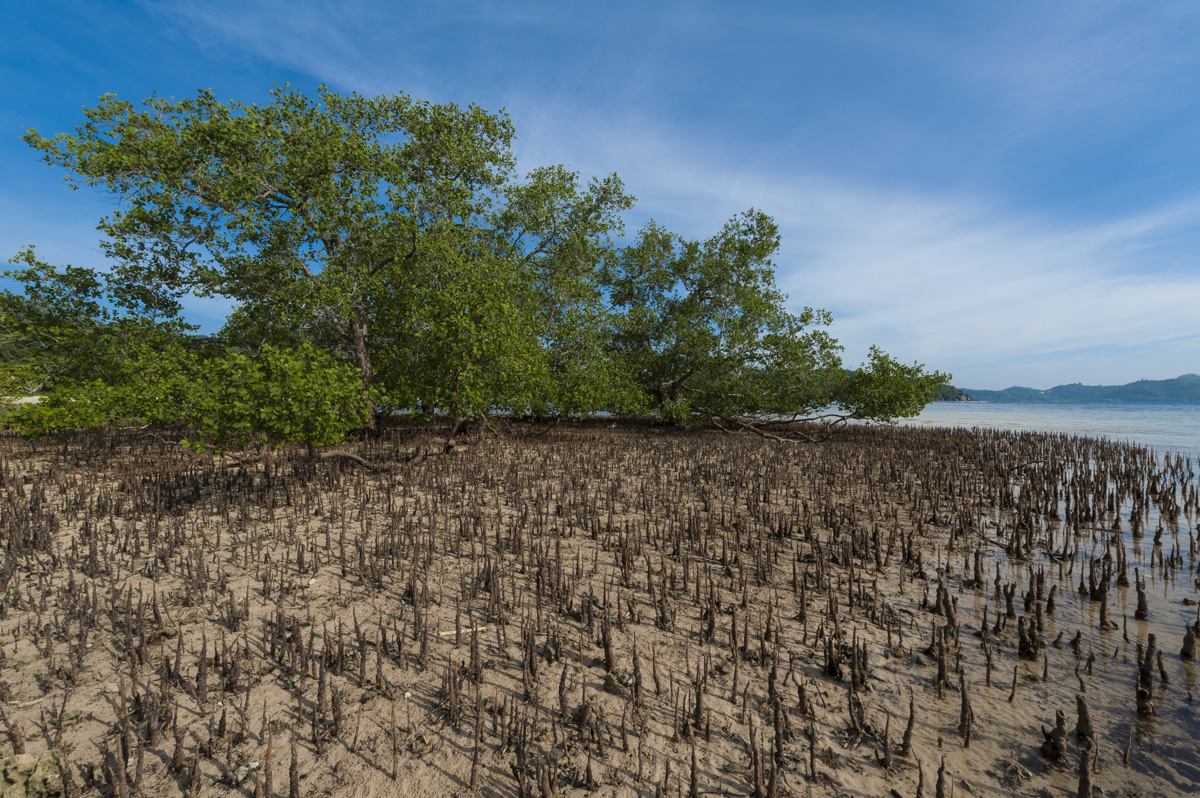
THE INITIATIVE


Mangroves play a major role in mitigating and regulating the impacts of climate change. They both act as a defence against violent storms and contribute to carbon sequestration and storage. They are also vital for sustaining local communities, particularly in terms of providing habitats and nurseries for species used in local economic development.
For years, the French Facility for Global Environment (FFEM) has been supporting projects that strengthen coastal resilience and help coastal communities adapt to climate change. Through its Mangroves Initiative, the FFEM aims to develop experience-sharing between projects involved in protecting and regenerating mangrove coasts, and to leverage and promote their outcomes.
The Mangroves Initiative is currently focused on four FFEM projects that share a number of common factors and convergent aims running in different parts of the world: Asia, West Africa, Central America and the Indian Ocean. Mangrove conservation and restoration is at the heart of these projects.
The Mangroves Initiative sees mangroves a nature-based solution: one that can be supported by restoring the ecological functions of the mangroves and the environmental conditions and practices that encourage their natural regeneration, through ecological engineering, and solutions combining grey and green infrastructure.
The aim of this initiative is to work collaboratively, using lessons learned, to construct solid arguments for the importance of mangrove restoration and ways of restoring mangroves.
AIMS
To develop experience-sharing through networking projects; to evaluate the different technologies deployed, their effectiveness, advantages, disadvantages and costs; to evaluate how they are adopted by local communities and the benefits they deliver.
To add to scientific and technological knowledge through scientific monitoring in the area of mangrove restoration and green belts, the conservation of their functionality, their capacities to mitigate the impacts of climate change and their role in carbon sequestration and storage. To raise awareness of non-FFEM initiatives in this field.
To leverage and promote project outcomes and best practice, by documenting lessons learned and producing promotional tools.
RESOURCES
The initiative relies on the support of partners, local specialists involved in the projects, and national and international mangrove experts
ACTIVITIES
SETTING UP A TECHNOLOGICAL AND SCIENTIFIC MONITORING SYSTEM
This involves monitoring several mangrove restoration projects around the world, as well as practical guides and new technologies. This information will be provided by the experts and their network and through monitoring activities, and will be made publicly available on the initiative’s website.
FACILITATING KNOWLEDGE TRANSFER BETWEEN PROJECTS
Seminars will be organised each year at a different location. Their aim will be to discuss the experiences, methods and results of that particular project, but also to analyse the successes or failures of the projects, with a view to leveraging lessons learned across projects. A final seminar in France, involving everyone working on these topics, will present the results.
LEVERAGING AND PROMOTING THE RESULTS
The experiences will be documented at regular intervals during seminars and field visits in order to support the leveraging and communication tools. A final document will be produced in the form of a methodological guide containing the lessons learned. The initiative will be promoted through:
• its website: initiative-mangroves-ffem.com,
• factsheets on the tools and methods developed,
• the capitalisation methodology guide,
• an illustrated publication, designed to appeal to a wide audience, on the role of mangroves and the experiences gained from the projects,
• production and dissemination of project videos and photos,
• publication of the final seminar proceedings,
• exhibitions.
COMMUNICATION
A photojournalist will help promote the outcomes by taking photos and video footage of the projects and building up a database of images to support the communication tools.
RESEARCH
The initiative will draw on a piece of research developed as part of a thesis jointly supported by the Centre for Functional and Evolutionary Ecology in Montpellier, France, and the CREOCEAN research consultancy.
